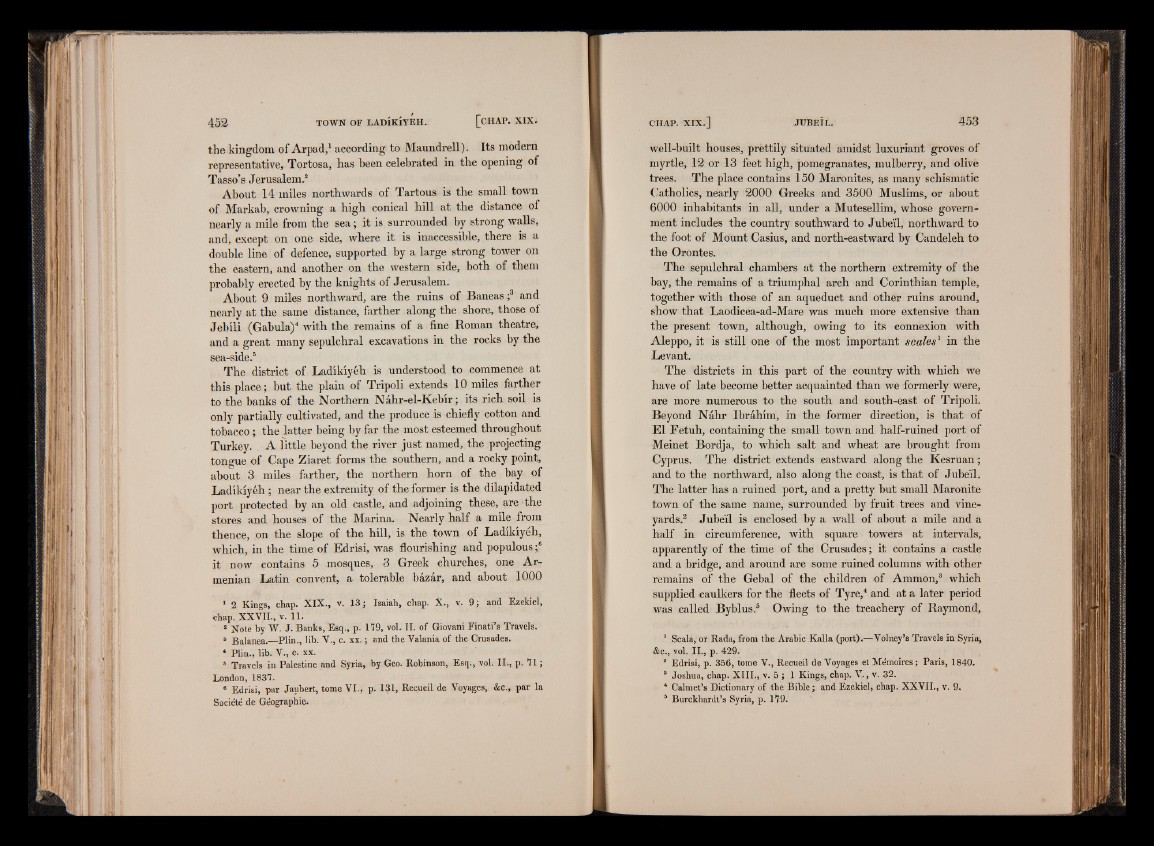
the kingdom of Arpad,1 according to Maundrell). Its modern
representative, Tortosa, has been celebrated in the opening of
Tasso’s Jerusalem.2
About 14 miles northwards of Tartous is the small town
of Markab, crowning a highi conical hill at the distance of
nearly a mile from the sea ; it is surrounded by strong walls,
and, except on one side, where it is inaccessible, there is a
double line of defence, supported by a large strong tower on
the eastern, and another on the western side, both of them
probably erected by the knights of Jerusalem.
About 9 miles northward, are the ruins of Baneas ;3 and
nearly at the same distance, farther along the shore, those of
Jebili (Gabula)4 with the remains of a fine Roman theatre,
and a great many sepulchral excavations in the rocks by the
sea-side.5
The district of Ladikiyéh is understood to commence at
this place; but the plain of Tripoli extends 10 miles farther
to the banks of the Northern Nahr-el-Kebir ; its rich soil is
only partially cultivated, and the produce is chiefly cotton and
tobacco ; the latter being by far the most esteemed throughout
Turkey. A little beyond the river just named, the projecting
tongue of Cape Ziaret forms the southern, and a rocky point,
about 3 miles farther, the northern horn of the bay of
Ladikiyéh ; near the extremity of the former is the dilapidated
port protected by an old castle, and adjoining these, are the
stores and houses of the Marina. Nearly half a mile from
thence, on the slope of the hill, is the town of Ladikiyéh,
which, in the time of Edrisi, was flourishing and populous;6
it now contains 5 mosques, 3 Greek churches, one Armenian
Latin convent, a tolerable bâzâr, and about 1000
1 2 Kings, chap. XIX., v. 13 ; Isaiah, chap. X., v. 9 ; and Ezekiel,
chap. XXVII., v. 11.
8 Note by W. J. Banks, Esq., p. 119, vol. II. of Giovani Finati’s Travels.
8 Balanea.—Plin., lib. V., c. xx. ; and the Valania of the Crusades.
* Plin., lib. V., c. xx.
3 Travels in Palestine and Syria, by Geo. Robinson, Esq., vol. II., p. 11 ;
London, 1837.
6 Edrisi, par Jaubert, tome VI., p. 131, Recueil de Voyages, &c., par la
Société de Géographie.
well-built houses, prettily situated amidst luxuriant groves of
myrtle, 12 or 13 feet high, pomegranates, mulberry, and olive
trees. The place contains 150 Maronites, as many schismatic
Catholics, nearly 2000 Greeks and 3500 Muslims, or about
6000 inhabitants in all, under a Mutesellim, whose government
includes the country southward to Jube'il, northward to
the foot of Mount Casius, and north-eastward by Candeleh to
the Orontes.
The sepulchral chambers at the northern extremity of the
bay, the remains of a triumphal arch and Corinthian temple,
together with those of an aqueduct and other ruins around,
show that Laodicea-ad-Mare was much more extensive than
the present town, although, owing to its connexion with
Aleppo, it is still one of the most important scales1 in the
Levant.
The districts in this part of the country with which we
have of late become better acquainted than we formerly were,
are more numerous to the south and south-east of Tripoli.
Beyond Nàhr Ibrahim, in the former direction, is that of
El Fetuh, containing the small town and half-ruined port of
Meinet Bordja, to which salt and wheat are brought from
Cyprus. The district extends eastward along the Kesruan ;
and to the northward, also along the coast, is that of Jube'il.
The latter has a ruined port, and a pretty but small Maronite
town of the same name, surrounded by fruit trees and vineyards.
2 Jube'il is enclosed by a wall of about a mile and a
half in circumference, with square towers at intervals,
apparently of the time of the Crusades ; it contains a castle
and a bridge, and around are some ruined columns with other
remains of the Gebal of the children of Ammon,3 which
supplied caulkers for thè fleets of Tyre,4 and at a later period
was called Byblus.5 Owing to the treachery of Raymond,
1 Scala, or Rada, from the Arabic Kalla (port).—Volney’s Travels in Syria,
&c., vol. II., p. 429.
2 Edrisi, p. 356, tome V., Recueil de Voyages et Mémoires; Paris, 1840.
2 Joshua, chap. XIII., v. 5 ; 1 Kings, chap. V., v. 32.
‘ Calmet’s Dictionary of the Bihle ; and Ezekiel, chap. XXVII., v. 9.
3 Burckhardt’s Syria, p. 179.